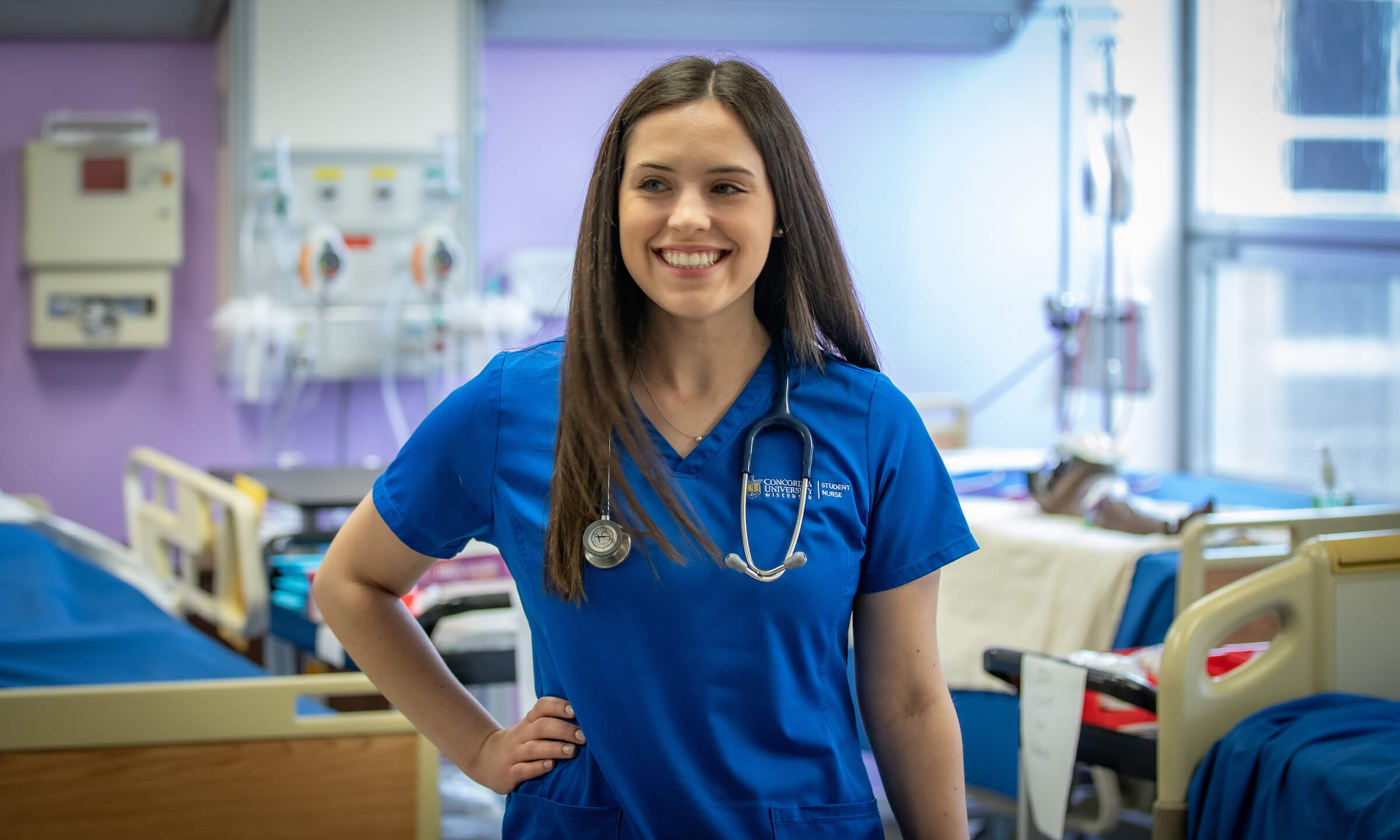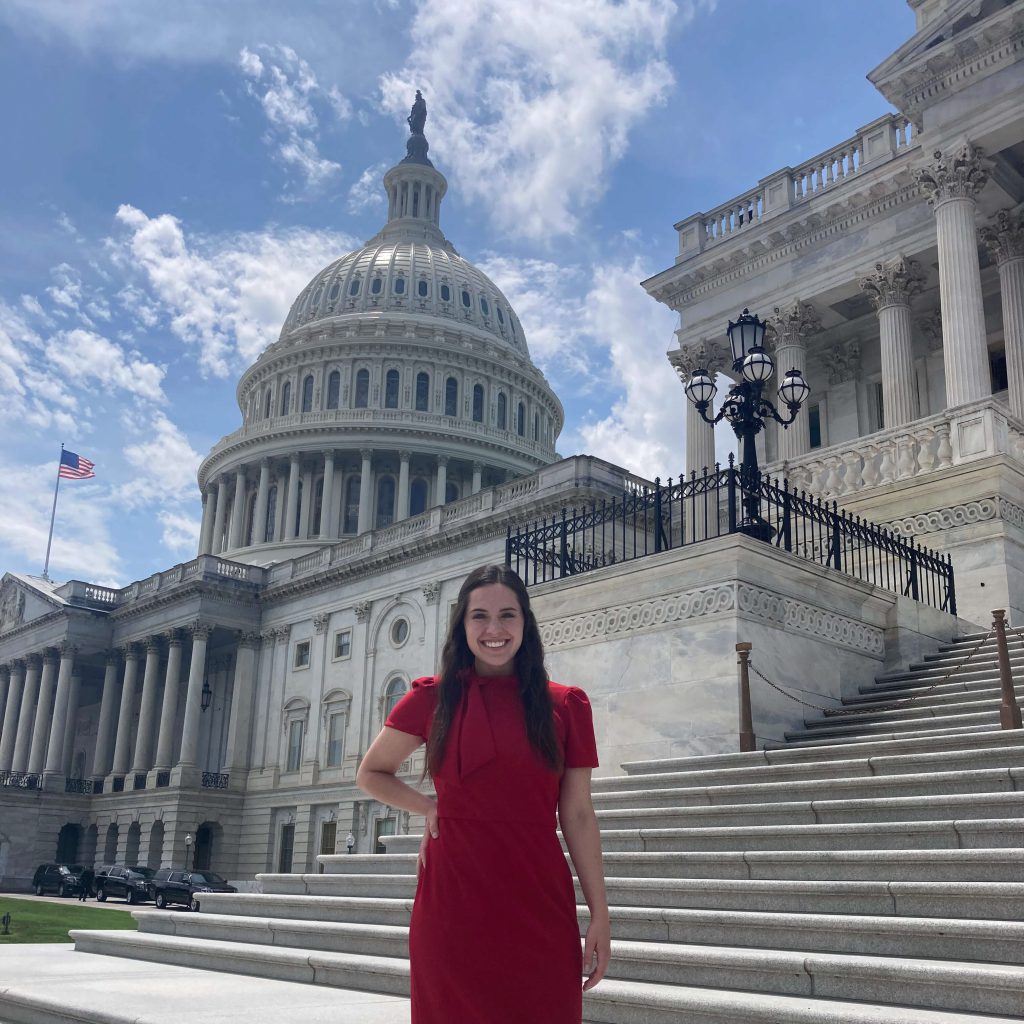
Meet Hallie Barteau (’23), a nursing graduate who advocates for her patients at the state level as well as their bedside.
Editor’s note: This is one in a series of stories highlighting a few Concordia’s uncommon May 2023 graduates. Faculty and staff submit candidates for consideration. Stories are posted in the days leading up to commencement. View more uncommon graduates here.
Hallie Barteau knows that in order to affect a patient at bedside, she’ll do well to keep an eye on the Senate floor.
Following high school, Hallie worked as a Certified Nursing Assistant within a nursing home. It was there that she first experienced the disconnect that can happen when laws are made without the input of a practitioner.
“There were rules that went into place that I personally felt were more disruptive to my work, or even potentially dangerous for the patient,” Hallie said. “Sometimes a law can make sense on paper, but if it doesn’t match up with practice, at the end of the day it doesn’t make sense.”
And if there’s one thing Hallie is passionate about, it’s making things make sense for the benefit of her patients.
This weekend, she joins CUW’s 600-plus candidates for graduation as they celebrate the completion of their academic degrees. Hallie has earned her Bachelor of Science in Nursing. She graduates Summa Cum Laude.
When policy and nursing intersect
After graduation, she’ll begin a job as a registered nurse working on a progressive care unit in Froedtert Hospital’s Center for Advanced Care. But don’t be surprised if one day you find Hallie with legislators on the floor—or at least influencing them.

She’s already dipped her toe into the world of policymaking. She interned two consecutive summers for the U.S. government: one in 2021 with the U.S. House of Representatives and the other in 2022 with the U.S. Senate. The latter took her to Washington, D.C. for the summer where she worked under a senior policy advisor. There she got to see the legislative process in action.
In February 2022, fellow student nurses in Wisconsin elected her to serve as Legislative Vice President for the Wisconsin Student Nurses Association. During her one-year term she drafted a resolution that passed unanimously, not just in Wisconsin but nationwide.
Through her role with WSNA, she participated in the annual Nurses Day at the Capitol and even got to introduce two State Senators to a crowd of hundreds of professionals who attended the event. And she serves as the student representative on the Wisconsin Nurses Association’s Public Policy Committee. The group meets monthly to review legislation at the state level and weigh in from their lens of expertise.
“I love policy. It’s a passion of mine,” said Hallie. “We, as nurses, care about the best thing for our patients, and the best thing for our patients sometimes comes down to what is best for the nurses. We should be showing up to talk to legislators and help in that way.”
Compassion for the patient experience
What drives her passion for policy is her patients, explains Hallie. Not so long ago, Hallie required the care of compassionate nurses herself during two separate trips to the emergency room while she was enrolled at Concordia.
On the first day of her sophomore year at CUW, doctors diagnosed Hallie with eosinophilic esophagitis (EOE), a chronic autoimmune disease that causes inflammation in the esophagus. Her situation became perilous when, over the summer, a piece of food lodged in her esophagus causing tremendous pain each time she swallowed.
Then, a few months later, she received a second diagnosis: postural orthostatic tachycardia syndrome (POTS). The condition sees an excessively reduced volume of blood return to the heart upon standing after sitting or lying down. As a result, individuals with POTS often experience dizziness, lightheadedness, or fainting when they stand.
Both of Hallie’s conditions were preceded by a period of uncertainty and lots of hospital visits as doctors investigated what might be the cause of her symptoms.
“There was a lot of worry and then, frustration,” Hallie said. “But I’m a resilient person so I did know that I would get through it. Something that I’ve always been told by different faithful people in my life is that God is with you through the highs and lows. That was definitely a comfort to me to know that He is bigger and stronger than any medical condition.”
Modeling Christian care
As Hallie learned to adjust to her new normal, she received support from many different Concordians. One such individual was Professor Brenda Jobe, DNP, RN, FNP, who has dealt with her own health battles. Jobe was diagnosed with multiple sclerosis in 1994. When the disease prevented her from practicing nursing in a clinical setting, Jobe turned her talents towards the classroom.
Nursing excellence at Concordia means holistically caring for the individual—in mind, body, and spirit. Jobe shares with each cohort of students a prayer practice she used when she worked bedside. While taking patients’ vital signs, she’d go through sets of timed intervals to measure radial pulse, then respiration, and so forth. Jobe would quietly add a 30-second count to allow time to inwardly say a prayer on behalf of her patient. She encourages students to consider doing the same.
Hallie also employs a prayer practice on behalf of her patients. When she began clinical rotations during her Concordia tenure, she would reserve her commute time for prayer. She plans to continue the practice as she starts her new job.
“I pray for the patients that I will soon provide for and that I can be equipped to best care for them,” Hallie said. “Sometimes it can be a very crazy work setting and prayer helps me keep focus. It makes me feel like I am doing my very best to provide for those patients and care for their human dignity.”
Sometimes it can be a very crazy work setting and prayer helps me keep focus. It makes me feel like I am doing my very best to provide for those patients and care for their human dignity.
Hallie Barteau (BSN ’23)
Advocating for others
Hallie cares deeply about preserving human dignity—whether that is done directly through practice or by advocating for laws that will best help her patients and colleagues. In Hallie’s opinion, both are necessary to ensure the very best care.
“The reason I initially got into nursing is for bedside,” Hallie said. “I love my patients. I love helping them. What drives my passion for policy is my patients, so if I didn’t go to the bedside and hear firsthand what they struggle with, I wouldn’t be able to advocate for them as effectively.”
Her own health journey provides motivation as well. The uncertainties and worries of her conditions helped her gain empathy for others who may be facing similar challenges.
“A lot of times a person’s struggles can help them be a more well-rounded and thoughtful person,” Hallie said. “Having that understanding of how I felt when I received my diagnoses will help me to support my future patients and be the very best nurse I can be.”
Want in?
The School of Nursing at CUW develops nurses ready to excel in today’s challenging health care context. As a nursing student, you will learn to care for people of all ages in both acute care settings and the community. Instructors and classroom experiences blend curricular rigor with a passion for care. This balance helps develop you uniquely both to serve with professional excellence and to fulfill your sense of calling as you care and serve throughout your career. Nursing undergraduate students also participate in the Concordia Core, a rigorous, liberal arts curriculum integrated with Lutheran distinctives.